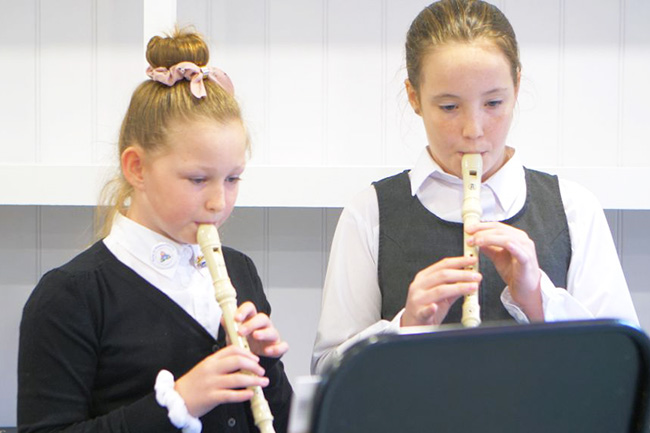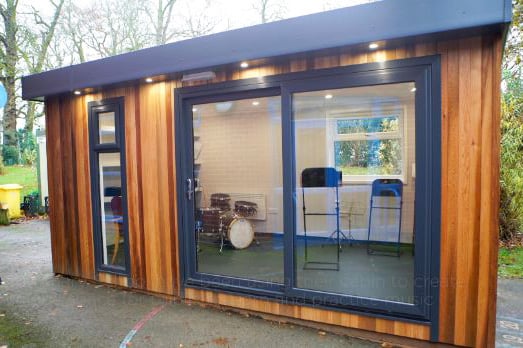
Why Your School Needs A Music Therapy Room
We’ve seen an increase in schools introducing music therapy to support both their mainstream pupils and their pupils with SEND, and they are finding huge positive results. So why should your school get involved by creating a designated space for music therapy sessions? Let’s discuss the benefits!

So… what is Music Therapy?
The British Association for Music Therapy states that: ‘Music Therapy is an established psychological clinical intervention, delivered by HCPC registered music therapists to help people whose lives have been affected by injury, illness or disability through supporting their psychological, emotional, cognitive, physical, communicative and social needs. Music therapists draw upon the innate qualities of music to support people of all ages and abilities.’ They explain that ‘a wide range of musical styles and instruments can be used, including the voice, and often the music is improvised.’
Interestingly, Rima Jakubauskas & Laura Pearce state that: 'When people play music together, we use the same basic social skills that are used in many other areas of life: sharing, turn-taking, eye contact, listening, and waiting. Music-making can be very self-expressive. Our moods, feelings, and personalities can be expressed through music. Importantly, music doesn’t rely on speech and language, which means that nonverbal people can access music therapy.'
Furthermore, 'in music therapy, the participants are encouraged to explore the different instruments and their sounds. This musical exploration leads to creating spontaneous songs. Therapists may also use familiar songs like nursery rhymes or pop songs in sessions. Music therapy is used to achieve therapeutic goals, such as using music to encourage communication, improve clients’ focus, build social skills, encourage play, and using music to support clients’ mental wellbeing and build confidence.’

What are the benefits of Music Therapy?
- Enhances social skills
- Develops resilience & confidence
- Improves access to the classroom environment through processing underlying issues & developing transferable skills
- A flexible service suited to each child’s situation & requirements
- A reason for reluctant attenders to come to school
- Support with processing trauma
- Specific work such as bereavement & attachment
- Support in school transfer & transition
- A service for those who are unable to access CAMHS
- Communication with those who are unable or unwilling to verbally express themselves
Why is Music Therapy at school great for students with SEND?
Introducing music therapy sessions in a designated music room at your school will be hugely beneficial for your students with SEND. For example, some students with ASD (Autistic Spectrum Disorder) can experience difficulties with communication and interaction with others. Also, some students with SEND might be non-verbal. The brilliant thing about music therapy is that it uses musical instruments and sensory sounds as the main mode of communication. This focus on non-verbal communication allows for contact and connection with a student's internal thoughts and feelings that may otherwise be very difficult or challenging to engage with or access through using words and language. Many feelings and emotions can be communicated, released and expressed.
The British Association of Music Therapy says that: 'because musical participation and response does not depend solely on the ability to speak, music therapy is a particularly effective clinical intervention for people who have difficulty communicating verbally.’ They also confirm that ‘children with autism can develop emotional, social and communication skills.’
Music therapy sessions support the development of a multitude of skills for students with SEND, such as:
- Release & exploration of emotions
- Listening
- Non-verbal & verbal communication
- Use of both gross & fine motor movements
- Sequential memory & recall of information
- Self-management of behaviour
- Verbal discussion
- Active, improvised music making (using both instruments & voice)
Creating a Music Therapy Room at your school
Creating a music room designated for music therapy sessions at your educational institution could not be easier with Cabins for Schools. We design and install bespoke school buildings tailored to your school’s specific requirements.
But why have a designated space for music therapy?
Your pupils deserve an additional, designated space for music and music therapy sessions! Gone were the days of struggling for room and ‘making do’ with store rooms or the hall when unused. Adding an additional build to your school grounds detached from the main build gives pupils the freedom to make as much musical noise as they wish without disturbing other lessons taking place around school. Our music rooms are fully insulated and can be used all year round, meaning drums, keyboards and recorders can be played throughout the whole school year and your pupils can receive music therapy support without limitations!
Check out one of our case studies! We designed and installed a bespoke music room for Langar C of E Primary School. Now, their students have a space to feel inspired, release their emotions and explore their musicality without the distractions of the communal areas.
Sources:
https://www.bamt.org/music-therapy/what-is-music-therapy
https://www.musictherapyworks.co.uk/
https://www.keychanges.org/children







